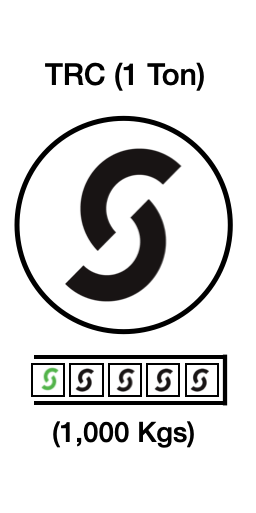Minting TRCs
When waste of type m arrives at an Accredited Recycler, and the material transfer is confirmed by a Validator at the Recycler, MassIDs of type m are transferred to the Recycler’s custody and become credits available to Carrot Fndn Auditors for review. Carrot Fndn Auditors perform the critical work of ensuring Recyclers are properly recycling waste type m and their amounts, in weight. The diagram below demonstrates how this process works.
Carrot Fndn Auditor approved credits (backed by certified-recycled MassIDs) are minted as:
Tokenized Recycling Credits (TRCs), and,
Tokenized Carbon Credits (TCCs), when carbon reduction can be measured. For more on TCCs see Minting TCCs and Carbon Credit Tokens sections.
TRCs, physical recycled waste material credits for things such as plastic, glass, aluminum, paper, cardboard, etc. get minted in one ton increments of each specific mass type from MassIDs that get recycled at a specific recycling facility. 1 Plastic TRC equals one ton of recycled plastic that was recycled at recycling facility x.
It is important to note that because MassIDs store the source location of waste creation, TRCs and TCCs can be identified by municipality. In this way, TRCs and TCCs can serve as an important tool for municipalities to implement and enforce Extended Producer Responsibility laws as well as Carbon Emission offset requirements.
Let’s take another look at how TRCs are packaged in the final minting step.

Because each TRC is expressed in 1,000 Kgs (1 ton) units, the last MassID to be added into a TRC package is usually split. Therefore, TRCs can be understood as a mathematical continuation of the sets of MassIDs (See MassIDs - Codifying Waste). They are both packaged commodities and the equation is expressed as:
TRC notation involves identifying the name of the token type, the Waste Type, Location and Unique code. Note that TRCs cannot be split as they already constitute exactly 1 ton units of certified-recycled waste.

It is important to note that TRCs are disassociated from the value of the actual physical raw material negotiated between parties in the recycling supply chain. TRCs do not interfere with existing recycling market commerce. Its value is obtained post facto from corporations, and other entities purchasing TRCs to meet ESG commitments and EPR (Extended Producer Responsibility) legal obligations to offset a portion of the pollution they generate. The Carrot Fndn creates this value by acting as a broker between owners of the MassIDs and firms needing to offset their waste/pollution footprints.
Last updated